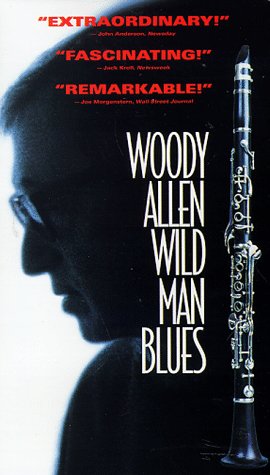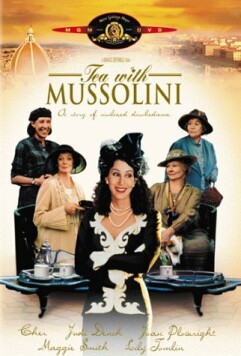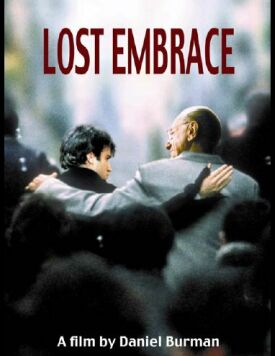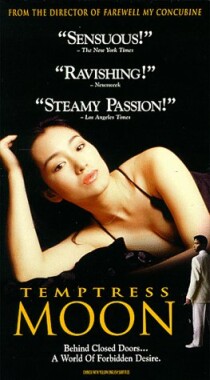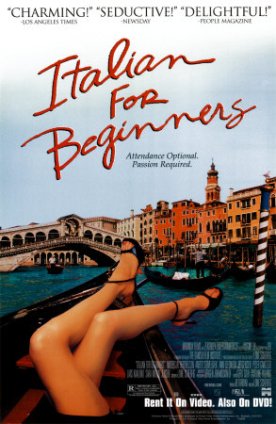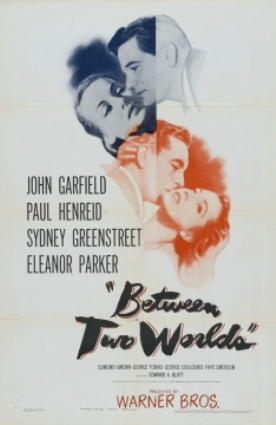Wild Man Blues
Wild Man Blues by Barbara Kopple is a documentary about Woody Allen and a pickup band and their tour of Europe to play New Orleans jazz. The deal must have been for Barbara to come along and get lots of shots of Woody and Soon-Yi, suitable for tabloid TV, in exchange for making Woody look good. And she does too, insofar as it is possible. Woody Allen comes across as much more warm and human than, I take it, he is in real life. He works hard at creating this impression too. He is just a barrel of laughs — one joke after another — but for the alert there are a few indications of the reality too, as when, at one point, Woody delivers himself of the opinion that it is not the audience he and his band should be thinking of: “It should be our pleasure.” In one particularly memorable scene, we catch him backstage badmouthing the audience in Turin for being wooden and unresponsive and then, in an interview, being effusive in his praise of the same audience.
The idea is, as it is elsewhere, to tell us that Woody is always on show. All the jokes tell us the same thing. Still, I think it a mistake to let the mask slip even for a second, for it reminds us that this show too is just, well, showmanship, and a deliberate cover for some pretty unattractive qualities. Not that at some level we don’t expect that. Mr Allen has built his whole career on converting neurosis into comedy, and so we get a liberal helping of his neuroses here, including the information — can it be true? — that he has to travel with a bathmat because he can’t bear to stand on plain marble (I wonder if he would have the same problem with tile?) and that he has to rent a second room when traveling with Soon-Yi because he needs to have his own bathroom everywhere he goes.
The music is enjoyable without being impressive, but once again Woody reminds us that in the music as in everything else it is his own feelings that are what is important: “There is nothing between you and the pure feeling of the playing,” he enthuses: “there’s no cerebral element to it at all.” This kind of jazz, he says, mixing his metaphors, “rings a bell in me for no explicable reason — like taking a bath in honey or something.” The rest of the band is introduced once, but apart from a brief excursus by the banjo player on the New Orleans style as an early dialect of jazz, we have nothing else to do with them. This film is, cinematically if not musically, a one-man band. It is another chapter in his history of self-absorption, and watching it is like getting to sit in on one of Woody’s sessions with his psychiatrist.
It is therefore not surprising that Soon Yi, too, is at best a supporting player. In one of the film’s most telling moments, when they are in the scarcely imaginable sumptuousness of the Deluxe Suite of the Hotel di Principe in Milan, Woody marvels at the heights to which he has lifted his paramour, “This kid who was eating out of garbage pails in Korea.,” he calls her. Mostly, though, she is expected to play the role of straight man, and the only interesting thing we find out about her is that she has never seen Annie Hall and her favorite of Woody’s films that she has seen is (what else?) Manhattan.
In the final scene, Woody returns home to New York where we see him with his aged mom and pop, incorporating them too into an impromptu stand-up routine. Mom refers to his having briefly taken up tap dancing in his youth and says, “You did a lot of good things, but you never pursued them.” She also insists that “You were brought up in a household that knew right from wrong. Don’t think that you are what you are because of yourself.” His father says, “You think because you write a script you’re a big shot. That’s bunk. . .” Woody jokingly asks if he still thinks he would have been better off as a pharmacist. Maybe so, says Pop. Maybe he’d have had a bigger audience, says Woody. This is supposed to add to the humanizing, but the banter seems to have something of an edge to it on the parents’ side. On our side too, come to think of it.
Discover more from James Bowman
Subscribe to get the latest posts to your email.

